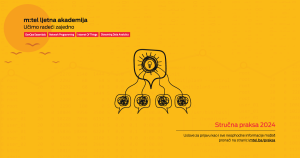SARAJEVO, November 14 (FENA) - A magnificent large beast that we humans admire but fear at the same time, reigns in vast forest areas and knows no borders that humans draw in maps. It is a bear that many countries cannot boast of inhabiting their territories, which is not the case for Bosnia and Herzegovina. The one whose home is here is a brown bear, and anyone who experiences a close encounter with this animal places it in their memory as a fascinating moment in life.
The protection of the brown bear in BiH has taken strange paths - in the Federation of BiH it is a protected species, while in the entity of Republika Srpska it does not have that prefix, but it is protected by a hunting ban. In the part where it is protected, it refers mainly to legal regulations, but not to field practice. The bear, of course, is unaware of such a strange and illogical situation in our country. He knows the forest expanses as his home, unaware of the unresolved legal regulations that concern it.
One of the attempts to partially regulate this area was initiated by the Center for the Environment in Banja Luka, which in recent years has implemented the project "Protection of brown bear in the Dinarides". As one of its basic conclusions, the following could be drawn - Bosnia and Herzegovina is a country with relatively preserved habitats and inhabited by a stable bear population.
The project covers two countries - BiH and Montenegro, because both share the Dinaric population of brown bears and neither of them is in the European Union, unlike Croatia and Slovenia, with which we also share the bear population.
As the coordinator of the project "Protection of the brown bear in the Dinarides" Aleksandra-Anja Dragomirović explains in an interview with FENA, that the EU member states, in addition to many other conditions for EU membership, had to meet certain preconditions regarding the management of nature, species and the bear species as such.
"As animals know no borders, it is impossible to ensure the sustainability of a species by managing only a part of its distribution, sticking strictly to planning the situation within the administrative border. The best solutions for monitoring the condition of species populations are those that include uniform methodologies in the field of population distribution," she underlined.
According to her, the project aimed to have a positive impact on Bosnia and Herzegovina and Montenegro by working on improving the monitoring process (monitoring the situation, the number of bears), drafting modern management and planning acts, forming and training an intervention team - a body capable of preventing and acting in crisis and risk situations per individual bear or per life and property of humans, with a clear protocol of action. It also promoted the importance of preserving and protecting this wonderful species.
One of the goals of the project is to establish a professional system for monitoring the brown bear population in BiH and Montenegro. Dragomirović points out that the project ambitiously entered into an attempt to conduct a comprehensive genetic analysis - non-invasive genetic counting of bears in BiH. This meant that in the entire territory of the country where the bear habitats during one autumn, genetic material (sample of bear droppings) was collected as much as possible.
"Unfortunately, we did not organize this ambitious endeavor in the best manner, so the insufficient number of collected samples and insufficient coverage did not provide information on the number of bears in BiH. However, this study, which is the first of its kind on a larger number of samples and in a larger area, gave us an insight that the genetic diversity of bear individuals is good, as well as the sex structure (number of males and females). We also learned how such a comprehensive survey should be organized in the future. It is comforting that it is extremely rare for such research to be successfully carried out in the first attempt. Certainly, this genetic analysis is an important step in the direction of modern species monitoring in our country," Dragomirović underlined.
She reminds that in addition to that way of counting, the traditional way of counting individuals is regularly performed in BiH, and that is done within the hunting sector, which is defined by the Law on Hunting. Although a somewhat outdated and imperfect method, she underlined, it still provides an important insight into the number of bears in our country.
Their number was estimated with not very satisfactory accuracy, but taking into account all available knowledge and parameters, it is a number of about 1,200 to 1,500 individuals for the whole of BiH.
The management plan is made according to the model and methodology of the EU countries, and as such, it is a necessary act for the implementation of certain declarations and conventions to which BiH is a signatory.
(FENA) S. R.









